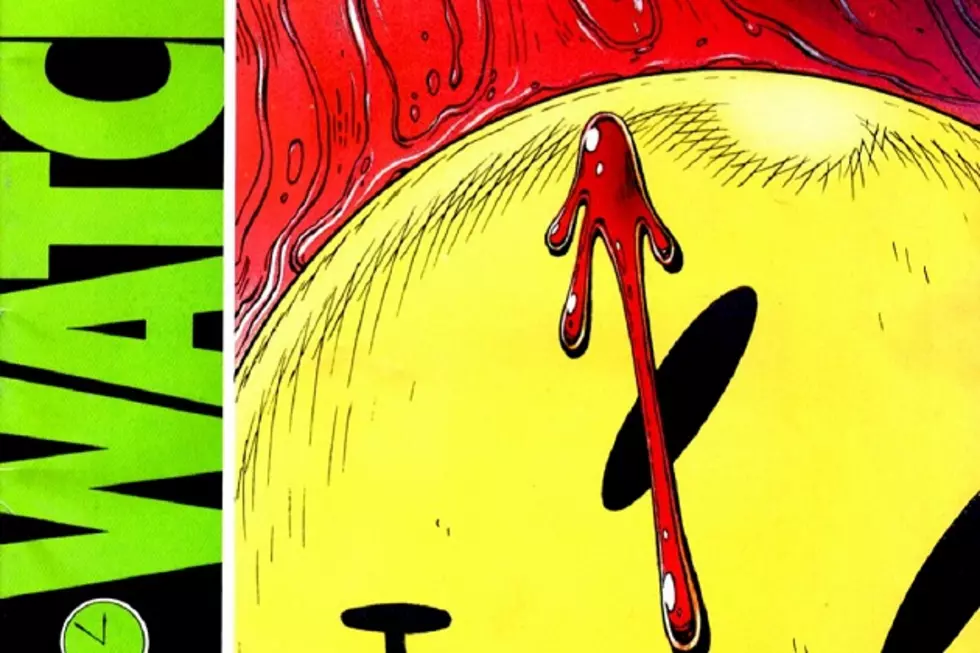
The Enduring Influence Of ‘Watchmen’
Stories set in an alternate history or reality are built from a "point of divergence," a moment at which the fictional reality veers off from our own. Germany wins World War II, Kennedy survives the assassination attempt, etc. In Watchmen that point comes in 1938. Shortly after the publication of Action Comics #1, costumed heroes begin appearing in the real world, the "factual black and white of the headlines," as Hollis Mason puts it, and history changes course.
In our reality, comics books experienced their own point of divergence on June 5, 1986, with the debut of the first issue of Watchmen by Alan Moore, Dave Gibbons, and John Higgins. Ever since then, the entire medium has been permanently altered by its startling vision and precise execution.
Watchmen has been referred to as "the Citizen Kane of comics," the greatest comic book or graphic novel of all time, one of the 100 best novels of the 20th century, and so on, with everyone from lowly teenage comics nerds to serious literary critics and academics bestowing more imaginary titles upon it year after year. Reading it is practically a coming-of-age experience for discerning superhero comic readers. It's beyond required reading; it's a ubiquity. The Beatles. Oxygen.
Watchmen came from Alan Moore's desire to create a superhero narrative that was more grounded in reality as a way to address the uneasy power structures of the Reagan era; a story as dense and complex as a novel, and yet unable to be anything but a comic book, taking advantage of the unique storytelling capabilities of the medium.
Originally planning to use Charlton characters, Moore and Dave Gibbons created their own analogues, and over the course of twelve issues the pair applied the gravity of the real world to the soaring personifications of ideals, and completely dismantled the concept of the superhero with appalling violence.
And that was the ultimate impression that Watchmen left on most readers. Not the remarkable level of craft and invention exhibited by both Gibbons and Moore; not structure or allegory, or the use of symbolism and motif. It was the dark, cynical treatment of superheroes that truly embedded Watchmen in the consciousness. With Watchmen's incredible success and mainstream media presence, the comics industry naturally had to adapt to take advantage of a new public awareness, and the best way to do that --- or the easiest way, at least --- was with more darkness and cynicism.
In a short time, most superhero comics looked more like Watchmen and The Dark Knight Returns. The real world edged its way further into four-color universes, and superheroes became more psychologically complex, violent, and morally relative. Spider-Man villain Kraven the Hunter committed suicide; Superman killed General Zod and his fellow Kryptonians. Even the fans got in on the act, phoning-in to demand the murder of Jason Todd.
Superhero comics became progressively darker and the overall quality of the genre suffered, as one title after another offered more of the same: a poor impression of the most superficial elements of Watchmen. The book had a nuclear impact, immediately sending shockwaves throughout the medium and leaving us with years of fallout. The "grim and gritty" movement dominated the marketplace, and darkness and mediocrity reigned.
Right?
Well, half-right. Moore has repeatedly expressed the opinion that he spawned a wave of imitators, and he's not incorrect, but it's objectively much more nuanced than that. Comics as a whole were undergoing a period of creative growth before Watchmen came along: the boom in independent publishing brought scores of daring new options to readers; both DC and Marvel were experimenting with unconventional projects like Frank Miller's Ronin and the Epic line; and before Moore even made his American debut, the writing in superhero comics was maturing at a rapid pace.
Comics were already headed in bold new directions; Watchmen just came along and set a more precise course. The popularity of the title provided publishers and editors with the motivation to take more risks, open up the talent pools, and release more daring material, and in the years immediately following its success, the creative growth that the medium was already experiencing went into overdrive.
Before the industry went full grim and gritty, the late '80s/early '90s was the most exciting period in comics since the 1960s. And Alan Moore is right: there are plenty of bad impressions of Watchmen. What he forgets are all the great comics that are nothing like it that still might have been published because of it
Just as each generation of readers discovers it, every generation of creators since Watchmen have been influenced by it, and Watchmen continues to have a palpable impact on comics. Is it the greatest comic of all time? Ah, no. It's not even the best Alan Moore comic of all time. But despite its flaws, despite being so misunderstood by so many for so long, it is so apparently brilliant that it will likely never go away.
It has inspired greatness and mediocrity alike, and probably will for as long as comics are published. As we all know, nothing ever ends.
More From Banana 101.5










